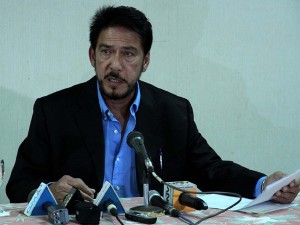Proposal to legalize marijuana use a ‘hallucination’, says senator
MANILA, Philippines – Senator Vicente “Tito” Sotto III strongly opposed on Wednesday the proposed legalization of marijuana use in the country and dared its proponents to raise the issue before the United Nations Commission on Narcotic Drug.
“Give me incontrovertible data that marijuana has medicinal or therapeutic purposes. Up to now, that is still subject to international debate,” Sotto said in a statement.
“We cannot trifle with something that we might regret later on. Toying with the idea of legalizing marijuana use is like playing with fire,” he said.
Sotto was reacting to some sectors, who have resurrected the move to legalize marijuana use after the state of Colorado in the United States began allowing the sale of recreational cannabis to anyone age 21 and older on January 1.
As expected, Sotto said, some sectors wanted to ride on the bandwagon.
But Sotto, who has been an anti-illegal drugs advocate, said he would not indulge in what he described as “hallucination” of the pro-marijuana advocates.
Article continues after this advertisementThe senator reminded that the country was a signatory to the 1961 United Nation’s Single Convention on Narcotic Drugs, as amended by the 1972 Protocol, which bans the production and supply of narcotic drugs and drugs with similar effects except for medical and research purposes.
Article continues after this advertisement“In its Preamble, the Convention recognizes addiction to narcotic drugs as a serious evil to an individual and its social and economic danger to mankind was recognized,” he said.
“Thus, any law which allows the use of marijuana for recreational purposes or any law which allows its use for alleged medicinal purposes without proper scientific data to support it, in my opinion, is a violation of this international treaty.”
Sotto said the Convention also specifically limited “the production, manufacture, export, import, distribution, use and possession of drugs to medical and scientific use and never for recreational use.”
“Be that as it may, any proposal for marijuana’s legalization even for medicinal purposes in our country should be backed up by relevant medical and scientific data and represented before the UN Commission on Narcotic Drugs,” he said.
At present, Sotto said, Republic Act No. 9165 or the Comprehensive Dangerous Drugs Act of 2002 classifies marijuana as an illegal drug, with its sale, trade or use punishable as criminal act.
“Any proposal to amend the law, by deleting marijuana or cannabis as dangerous drug is exclusively within the province of the legislative department,” said the senator.
As such, the Department of Health, the Dangerous Drugs Board, the Philippine Medical Association, or any other agency for that matter may not encroach on this prerogative of Congress, Sotto added.
The senator then challenged pro-marijuana advocates to bring their case before the United Nations Commission on Narcotic Drugs and prove that marijuana can cure anything or something.
“Up to now, there is no empirical and scientific data that proves marijuana can cure,” he pointed out.
Even the states of Colorado, Sotto said, has yet to determine whether allowing legal pot has any effect on crime rates and cannabis addiction and use among teenagers.
Related Stories:
Palace: Marijuana is illegal in Philippines
Shoppers wait for Colorado pot shops to open
